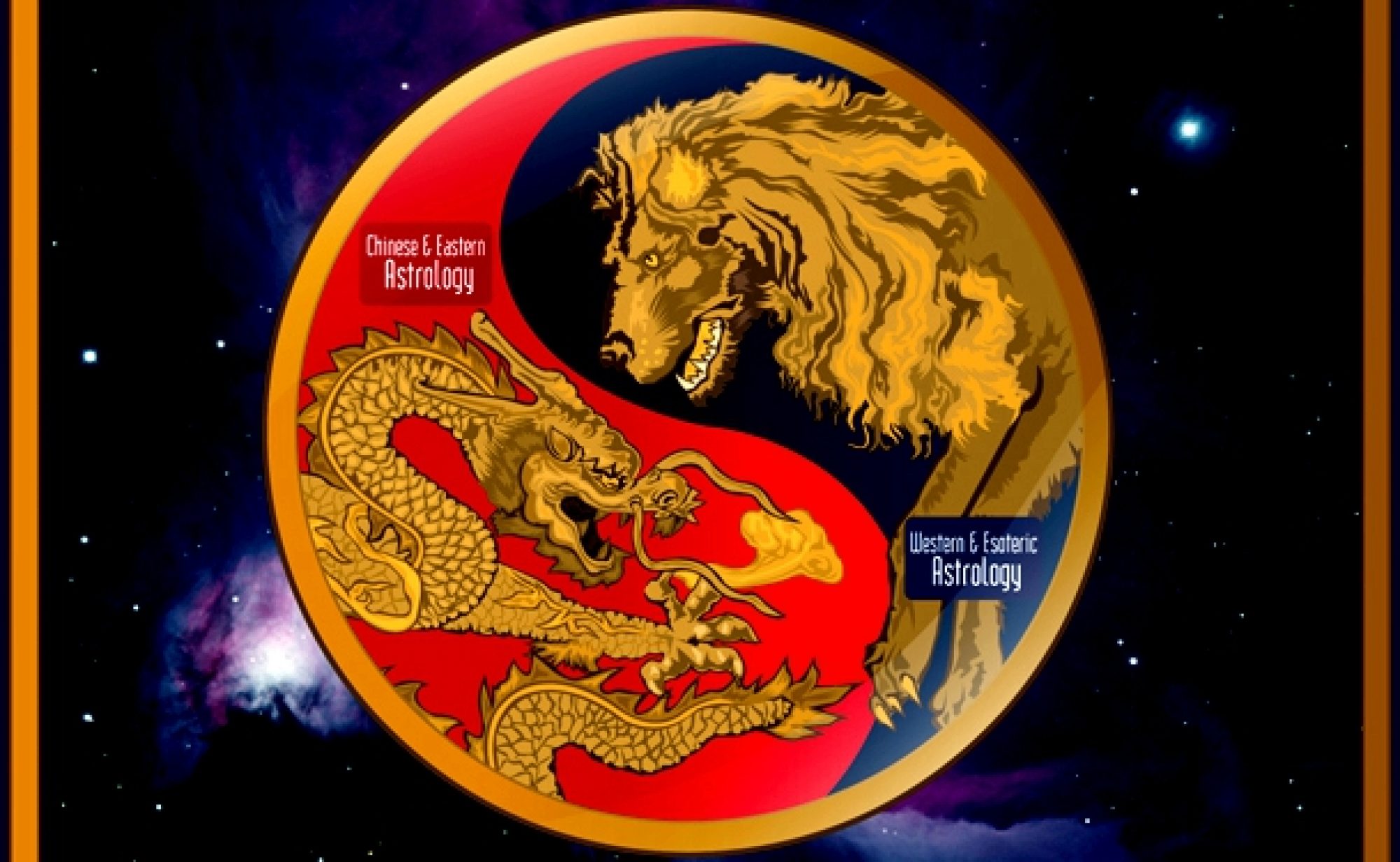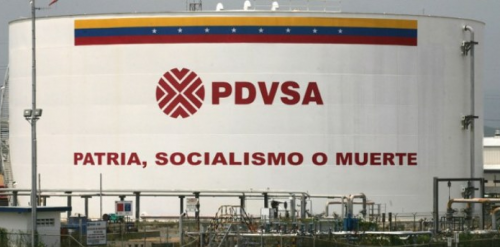Continuing on from the previous discussion, we need to look at what has been happening with Venezuela in the past couple of months. To start, this is not some new initiative on the part of the US. Ever since the Bolivarian Revolution in 1999 Washington has been trying to subvert the democratic revolutionary gains. Bush and Co. fomented the coup against Chavez in 2002 as a start. So, we start with the directions to Venezuela at the time of the Revolution.
Keeping in mind the Revolution was not the overthrow of a government (Chavez was elected democratically), but rather the end of an old system of governance, the chart for the Revolution is below (bigger):
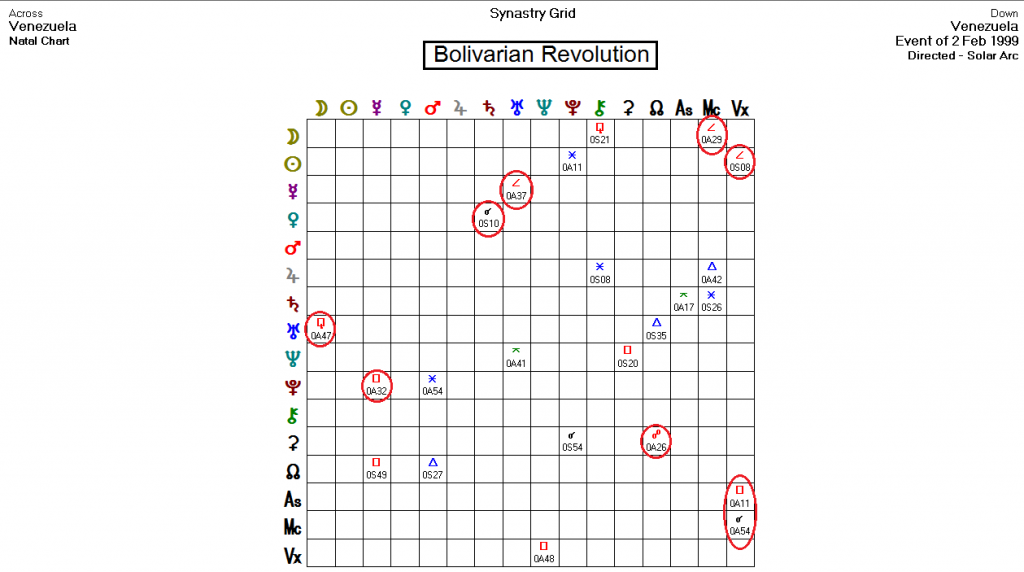
The Revolution started the day Chavez took office. In the chart we see the Vertex axis strongly activated, indicating a new point of view coming to the nation, as well as a stronger spiritual impulse for the nation. It was never going to be easy. Uranus made a solar arc to Venezuelan Moon, (9th house ruler) showing the shakeup in the philosophy of the nation, as well as with the judiciary. Directed Pluto was square Mercury, shaking up alliances (11th house) and foreign banking interests (8th house) as well as showing the change in dialog among Venezuelans (Mercury in general) and the end of an old narrative. Directed Mercury was aspecting Uranus, showing the introduction of new ways of thinking about Venezuelan identity and also energizing opposition to the existing government at the time (Uranus ruling the 4th house). And directed Ceres was at the bending of the Venezuelan nodal axis, showing a turning point in the shared destiny of the nation. There are other things we could consider, but this is sufficient for our purposes.
Prior to the Bolivarian Revolution Venezuela was ruled by US-friendly administrations, and received only 1% of the profits from its oil. The reason Venezuela was so wealthy in the 1970s was because of the oil shock of 1973, which sent world oil prices soaring, which also resulted in the creation of the petro-dollar. But although Venezuela, the country, was rich, Venezuelans as a majority were dirt poor. They suffered under extreme poverty at the height of the 1970s. At the time of the founding of Chavez’s Party, The Fifth Republic Movement, in 1997, the poverty stats for Venezuela stood at close to 70%, dropped sharply the following year to just over 40%, and has fallen steadily ever since socialism was introduced in Venezuela. In 2015 the figure was at about 20%. That is only slightly above the figures for the US and the UK. This is why there is such support for Maduro among the poor in Venezuela.
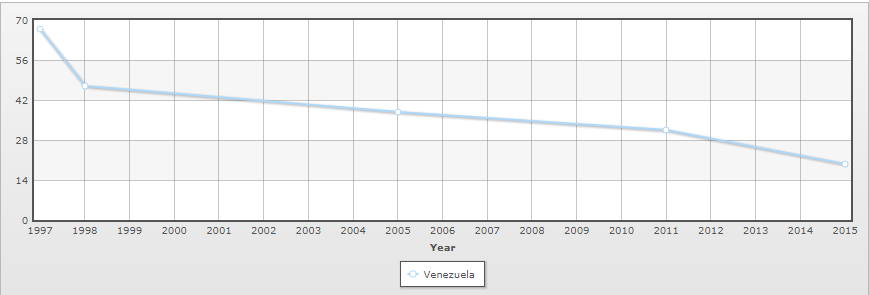
Washington could care less about the people of Venezuela. As Venezuelans know, the current posturing of the US and its allies is about Venezuela’s resources, especially its oil and gold. John Bolton has said as much, from a Fox News interview: “It will make a big difference to the United States economically if we could have American oil companies invest in and produce the oil capabilities in Venezuela.” It is quite symbolic, actually. But what we are not told – and this is the big secret behind Washington’s moves in Venezuela, as well as European support – is that there is a huge, untapped field of light crude laying off the coasts of Venezuela, Brazil and Guyana, perhaps the largest in the world, which has been in dispute for years. This is not simply about Venezuela’s oil, in the way it is portrayed in most independent media. In point of fact,:
The real prize [in Venezuela] is the ultimate control over one of the best-kept secrets in the oil industry, the huge oil reserves of a disputed area straddling Venezuela, Guyana and Brazil. The region is called Guayana Esequiba. Some geologists believe the Esequiba region and its offshore could contain the world’s largest reserves of oil, oil of far better quality that the heavy Orinoco crude of Venezuela. The problem is that owing to the decades-long dispute between Venezuela and Guyana the true extent of that oil is not yet known.
And where exactly is that oil? A picture is worth a thousand words:
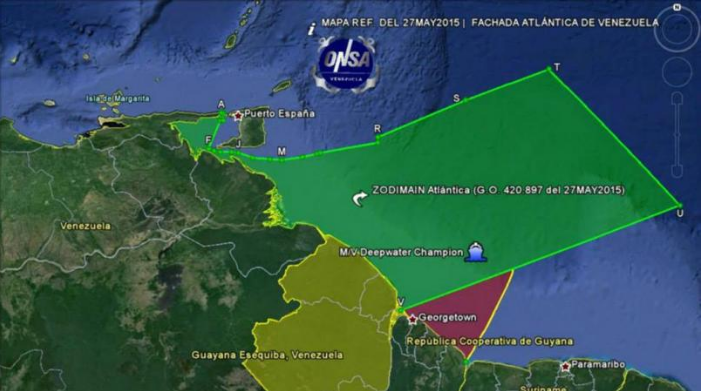
The dispute over the Esequiba region goes all the way back to the 19th century, is connected with the Monroe doctrine, and was between Washingtonian, British and Dutch interests. There are huge competing interests for that oil, too. And guess from where: Russia, China, the US, Britain, France and Spain, being the main ones. There are others, too, like Brazil. In fact, all of South America has a stake in that oil, especially Brazil, being the largest economy there. A few of the main Western nations which recognized Guaidó are in that list. It would be very convenient for those nations were they to oust Maduro and install Guaidó, who would be more than happy to fill their coffers at the expense of poorer Venezuelans, and probably return Venezuela to its pre-Revolution state of affairs. But there is another little twist to the story, from the same article:
China has formally incorporated Guyana into its Belt, Road Initiative and is building a highway link from Manaus in Northern Brazil through Guyana giving Brazil far more efficient access to the Panama Canal, cutting thousands of miles off the shipping route. Notable also are Chinese efforts in Panama, the central shipping crossing between Atlantic and Pacific Oceans. In 2016 China’s Landbridge Group bought Panama’s Margarita Island Port, the largest port, on the canal’s Atlantic side, giving the Chinese company intimate access to one of the most important goods distribution centers in the world.
It is also of interest to note for Australian readers that China now owns Darwin’s port and holds a large stake in Melbourne’s and Sydney’s ports in Australia as Australia continues to sell off its infrastructure. So, we see that there is far more at stake here than simply control of energy resources. The entire Caribbean basin is involved, with Russia and China making inroads in America’s back yard, and in no small manner, either. Socialist-leaning governments in the region do not allow for dollar-dominance, either. It is not just about resources. It is about control and ownership of trade routes, finances and currency, too. So in a previous post, mention was made about an alternative reason for the border wall between Mexico and the US. It does not take much imagination to see what is going on here behind the scenes, painted over with images and talk of starving, oppressed Venezuelans.
The present crisis was put in motion since January 1st with secret flights being made from an air base in Florida to Venezuela and Columbia. At least one of those flights had a cache of weapons on board, proudly displayed by Venezuelan customs officials. That was on February 7th, a full month after the flights had started. Once the weapons had been displayed the flights mysteriously stopped. One wonders why. These flights were made by the same Greensboro, NC airline that had been involved in rendition flights in the past to secret locations. Greensboro is only a short drive from where I grew up, so that article caught my eye. This is all part of a long and dirty involvement of Washington in Latin American affairs, and it is still ongoing. The weapons are claimed to have been destined for forces opposing the Maduro government.
It doesn’t stop there, though. There was a small insurrection by Venezuelan National Guardsmen that was busted by Venezuelan authorities shortly before the latest protests and Guaidó’s pronouncement, but for the major part the military in Venezuela is standing firm. There is a larger picture with the current crisis, though, outside of Venezuela, which will have long-term repercussions throughout the region. The crisis in Venezuela is also having carry-on effects, notably in Haiti, where protests against the government there started after the recognition of Guaidó by Haiti’s president. The story is worth quoting from an article and throws a bigger light on the picture. There is a connection there with Venezuelan oil, too:
Using Venezuela’s vast oil wealth, Chávez began an unprecedented experiment in solidarity and capital seeding, the PetroCaribe Alliance, which was launched in 2005 and eventually spread to 17 nations across the Caribbean and Central America. It provided cheap oil products and favourable credit terms to member nations, throwing them an economic life-line when oil was selling for $100 a barrel…On the day of his May 14 inauguration, Préval [Haitian president] signed up for the PetroCaribe deal, greatly vexing Washington, as revealed by WikiLeaks-obtained secret US diplomatic cables. After two years of struggle, Préval eventually got Venezuelan oil and credit, but Washington made sure to punish him too.
Washington went on to foment a coup in Haiti in 2010, following the major earthquake there, thereafter installing a puppet leader in the form of Michel Martelly. He went on to embezzle and misspend the greater part of the PetroCaribe funds, which was eventually terminated altogether. To cut a longer story short:
Life in Haiti, which was already extremely difficult, now became untenable. With the Venezuelan crude spigot now closed, Washington’s enforcer, the International Monetary Fund, told Moïse he had to raise fuel prices, which he tried to do on July 6 last year. The result was a three-day popular explosion which was the precursor to today’s revolt. At about the same time, a mass movement began asking what had happened to the $4 billion in Venezuelan oil revenues that Haiti had received over the previous decade. The PetroCaribe Fund was supposed to pay for hospitals, schools, roads and other social projects, but the people saw virtually nothing accomplished. Two 2017 Senate investigations confirmed that the money had been mostly diverted into other pockets. So, what was the straw that broke the camel’s back? It was Moïse’s treachery against the Venezuelans after their exemplary solidarity. On January 10, in a vote at the Organization of American States (OAS), Haiti voted in favour of a Washington-sponsored motion that said Maduro is “illegitimate” after he won more than two-thirds of the presidential vote last May.
Venezuela is the latest in a long list of regime change disasters executed by Washington. In its attempt to provoke some sort of military ‘humanitarian’ intervention, Pompeo has gone so far as to suggest that Hezbollah is active in Venezuela. Hezbollah? Really? We have to ask why a Lebanese opposition group would be active in Venezuela, across the ocean, when it has far greater challenges right next door. The same sorts claims have been levelled against Cuba, which has only support personnel there, medical for the largest part. Such claims as Pompeo has made are part of the of regime change playbook and have been met largely with skepticism. There has even been talk of blockading and attacking Venezuela if Russian weapons end up there. Then, anything can be manufactured and presented as ‘evidence’.
There are so many things of which to take account here: racism as a factor (the opposition to Maduro is visibly of lighter skin), class warfare (the opposition is also largely from the middle and upper classes) and counterclaims about the same, talking about human rights in Venezuela when right next door in Columbia they are facing their own humanitarian crisis (which is not in the major newsfeeds), the real function of the ‘Lima Group’, blaming Vladimir Putin for escalating the troubles, and so on. Venezuela is a complex society, and to pin the troubles there on any one factor or faction ignores so many other important considerations. But one thing is for certain – the Americans and the Europeans have less than altruistic motives when it comes to Venezuela.
For his part, Maduro appears to be ready to face any and all comers. So, the world will watch with bated breath this Saturday to see what comes of the aid convoy provocation. But in the meantime, the bus driver would appear to be doing his best to preserve the Bolivarian state and guide it toward a better future. He faces probably his greatest tests this year. If he survives and persists as president of Venezuela, the nation and the Revolution may just stand a good chance of prospering again in the future, along with a transformed Caribbean basin. There are high stakes in the geopolitical game here. We wish the Venezuelans well in their struggles.
Featured Pic from Italia Salva
